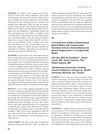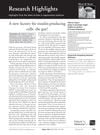50 citations,
April 2010 in “Biology direct” Low androgen levels might delay prostate cancer but could lead to more aggressive, therapy-resistant cancers.
1 citations,
January 2024 in “Microorganisms” Mice with a virus similar to COVID-19 had skin damage, but a special treatment helped repair it.
 13 citations,
January 2014 in “PubMed”
13 citations,
January 2014 in “PubMed” Adiantum capillus-veneris Linn reduced hair loss and improved hair growth in mice with testosterone-induced alopecia.
12 citations,
March 2017 in “Arteriosclerosis, thrombosis, and vascular biology” Testosterone helps prevent skin damage in males by acting through both estrogen and androgen pathways.
 6 citations,
July 2015 in “Journal of Investigative Dermatology”
6 citations,
July 2015 in “Journal of Investigative Dermatology” Chicken feather gene mutation helps understand human hair disorders.
 5 citations,
December 2021 in “Scientific Reports”
5 citations,
December 2021 in “Scientific Reports” Age affects how certain proteins involved in COVID-19 infection are expressed in mice, but sex hormones and heart injury do not.
September 2024 in “Frontiers in Neuroendocrinology” 5-alpha reductase inhibitors may help protect the brain and gut in Parkinson's disease.
 June 2023 in “Current Issues in Molecular Biology”
June 2023 in “Current Issues in Molecular Biology” DN106212, an extract from a plant, is better at promoting hair growth than other tested substances by affecting hair growth factors and follicle development.
 April 2021 in “IntechOpen eBooks”
April 2021 in “IntechOpen eBooks” Androgens, male hormones, affect physical and mental functions, with a decrease leading to health issues like muscle loss, bone disease, and depression, and more research is needed on long-term effects and treatments.
 April 2017 in “Plastic and reconstructive surgery. Global open”
April 2017 in “Plastic and reconstructive surgery. Global open” Fetal scalp cells have more regenerative genes than adult cells, and decellularized muscle matrix is better for muscle repair than commercial alternatives.
 April 2024 in “Frontiers in endocrinology (Lausanne)”
April 2024 in “Frontiers in endocrinology (Lausanne)” Melatonin improved secondary hair growth in goats but didn't affect primary hair density or litter size.
January 2021 in “Medpulse International Journal of General Medicine”  March 2024 in “International Journal of Pharmaceutics”
March 2024 in “International Journal of Pharmaceutics” Ginsenoside Rg3 combined with minoxidil was more effective in treating hair loss in mice.
 65 citations,
January 2011 in “Frontiers in Endocrinology”
65 citations,
January 2011 in “Frontiers in Endocrinology” Neurosteroids show promise for treating epilepsy and more research is needed.
 70 citations,
March 2010 in “The Journal of Steroid Biochemistry and Molecular Biology”
70 citations,
March 2010 in “The Journal of Steroid Biochemistry and Molecular Biology” Blocking a specific enzyme might help treat obesity and diabetes, but more research is needed to ensure it's safe.
 50 citations,
July 2021 in “Nature Communications”
50 citations,
July 2021 in “Nature Communications” The drug enzalutamide may reduce the ability of the virus causing COVID-19 to enter lung cells.
 49 citations,
July 2009 in “Fitoterapia”
49 citations,
July 2009 in “Fitoterapia” Essential oils from Chamaecyparis obtusa may help hair grow by increasing a growth-related gene.
 30 citations,
May 2018 in “Experimental Dermatology”
30 citations,
May 2018 in “Experimental Dermatology” The conclusion is that future hair loss treatments should target the root causes of hair thinning, not just promote hair growth.
 16 citations,
April 2007 in “Journal of Medical Primatology”
16 citations,
April 2007 in “Journal of Medical Primatology” The monkey's hair loss was due to an autoimmune disease, not genetics.
 15 citations,
November 2015 in “Journal of Cosmetic Dermatology”
15 citations,
November 2015 in “Journal of Cosmetic Dermatology” Botanicals like green tea extract show potential for hair growth, but more research is needed.
 15 citations,
June 2015 in “Lasers in Medical Science”
15 citations,
June 2015 in “Lasers in Medical Science” The 830-nm wavelength was most effective at promoting hair growth in rats using low-level laser therapy.
 13 citations,
January 2020 in “Neuroscience”
13 citations,
January 2020 in “Neuroscience” Blocking 5α-reductase can harm memory and brain structure, and increase harmful brain changes in male mice used for Alzheimer's disease research.
 8 citations,
March 2020 in “Frontiers in Cell and Developmental Biology”
8 citations,
March 2020 in “Frontiers in Cell and Developmental Biology” Researchers created immortal human skin cells with constant testosterone receptor activity to study hair loss and test treatments.
 7 citations,
July 2012 in “Regenerative Medicine”
7 citations,
July 2012 in “Regenerative Medicine” New treatments for diabetes, central nervous system repair, and cartilage injury were found, and a way to create functional hair follicles from stem cells was developed.
 6 citations,
October 2013 in “Plastic and Reconstructive Surgery – Global Open”
6 citations,
October 2013 in “Plastic and Reconstructive Surgery – Global Open” HSL treatment speeds up hair growth and reduces oxidative stress in hair follicles of ob/ob mice.
 2 citations,
April 2016 in “Medical Hypotheses”
2 citations,
April 2016 in “Medical Hypotheses” Antioxidants might help prevent pressure ulcers, but more research is needed to find effective ones.
 2 citations,
January 2013 in “Advances in Experimental Medicine and Biology”
2 citations,
January 2013 in “Advances in Experimental Medicine and Biology” Taurine might help prevent hair loss caused by stress.
 January 2020 in “Elsevier eBooks”
January 2020 in “Elsevier eBooks” Plant-based chemicals may help hair growth and prevent hair loss but need more research to compete with current treatments.
 391 citations,
January 2010 in “Journal of The American Academy of Dermatology”
391 citations,
January 2010 in “Journal of The American Academy of Dermatology” Half of people with Alopecia Areata may see hair regrowth within a year without treatment, but recovery is unpredictable.
 137 citations,
March 2006 in “Cns Drug Reviews”
137 citations,
March 2006 in “Cns Drug Reviews” Finasteride treats enlarged prostate and hair loss, but may cause side effects in some patients.
























